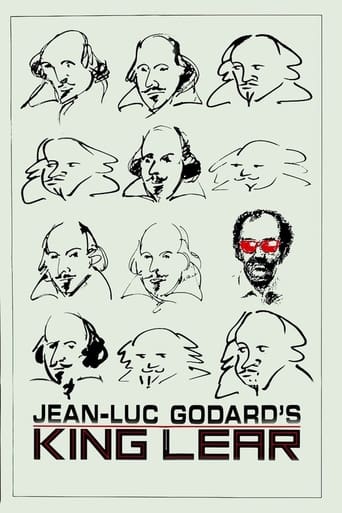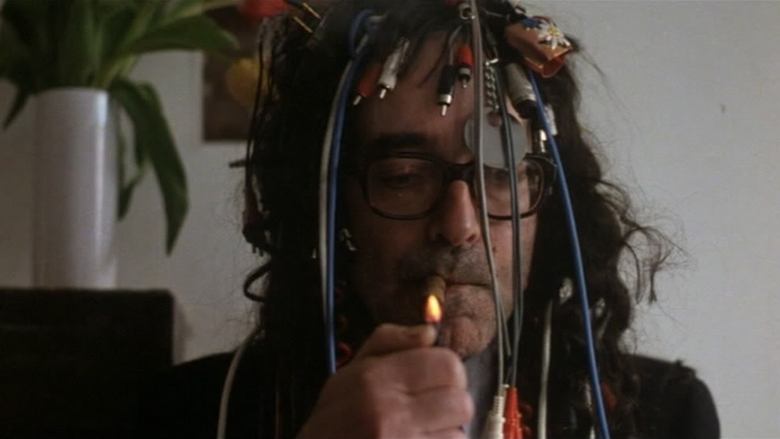

King Lear (1987)
A descendant of Shakespeare tries to restore his plays in a world rebuilding itself after the Chernobyl catastrophe obliterates most of human civilization.
Watch Trailer
Cast


Reviews
It's interesting that director Jean-Luc Godard flashes up the title card King Lear: Fear and Loathing throughout this film, as he himself appearing on the screen looks like Hunter S. Thompson...that is, if HST was French and on a mix of downers and trippers. Upon watching Godard's King Lear the first time, I understood this much - William Shakespeare Junior the Fifth (Peter Sellars) is in the process of writing something for the Cannon Group in a post-Chernobyl mind-f*ck parallel universe, where art and movies are faded memories and where Don Learo (Burgess Meredith) and his daughter Cordelia (Molly Ringwald) talk of separate philosophies and emotional struggles. Then, other than that, I was totally befuddled by the cinematic approach Godard was taking to the material. And yet there was something about the film that intrigued me, how there was such a height of intellectualism going on from Godard's head to the celluloid that it almost reverberated to ludicrous-ness, so I watched it again, giving it another shot.What King Lear does accomplish, at least up to a point, is that Godard's trying to get inside the mind of a writer (if not himself, which is more than likely the case, then of the spawn of Shakespeare), as he tosses about various ideas and nonsense to pound out a story and characters. The film also gives some interesting and true improvisation time for an actor like Meredith, and once in a while Godard's Professor Pluggy makes a point of fascination (i.e. the significance of images and emotions). What King Lear doesn't accomplish is some sense, even sense that intellectuals could be able to latch onto. Godard's basically making a film for himself, delving into themes and stylistic techniques that only he would understand, and since he limits what the audience can latch onto and comprehend of what philosophical goals and meanings he's derived from Shakespeare's classic, it's pretentious more often than not. The mis-en-scene is a bizarre contrast, as everything in the camera-work is clear and lovely, while the audio side of things almost works to annoy the viewer. The sounds of seagulls are practically inexplicable (unless he's trying to have the POV of the character every time a seagull chirps, which is over-the-line for me), the over-lapping of puzzling Shakespearian-esquire philosophy over some of the dialog is too much to concentrate on and digest, and the way Godard talks he might as well be speaking through a voice box.So, I think that King Lear is a bit of a mess, but for some reason I don't think it's a failure. It's the kind of mess that only a director like Godard could go for and make his own. A hack wouldn't even KNOW how to use such weird narrative devices like this man does. The film could even be of use to be dissected by someone scene-by-scene (although it could perplex someone enough to destroy the videotape their watching and curse Godard for all eternity), and as an experiment of treating Shakespeare it's not the worst in history. But I would not want to test myself with this again. Even Woody Allen (who bookends the end of the film with only minimal Shakespeare dialog and hands amusingly fiddling on the film) must've been scratching his head through most of this. So it's recommendable not so much as an enjoyable poetic musing like Band of Outsiders or even Pierrot Le Fou's oddball mixture. Reall, it's a challenge for a film buff that'll at best intrigue and get thinking and at worst be something to throw up in the air and shoot at with a bebe gun.
Spoilers herein.Lear is about sight and truth, and incidentally about how devilish charms (derived from the audience's participation and perception) bend sight and truth. So it (and the similarly placed `The Tempest') are naturals for film, especially self-referential films about films and filmmaking.Self-referential filmmaking is an art that the French believe they invented -- and they have a continental tradition of deconstructive semiosis to draw from. So this would seem a natural. Godard is an experimentalist -- a theorist -- but not a great artist, and it shows here. Because he doesn't know, or can't reach, the deep structure of Lear on that matter. For Shakespeare, confusing forces of naming emerge from a capricious aether, drawn forth by the creative process of life. Modern semioticians hold that this comes from the hidden inner mind, drawn forth by the messy animal processes of life. Godard rattles about with this thin notion, somewhat of a curse for the French, and never touches the deeper notion, which accidentally fell, it seems, on the English. The French have never forgiven them, and here equate the notion (and films about it) to American gangsterism.
The first time I saw this, I really disliked it. Even compared to Godard's other ramblings of the 70's, it was still a little too disparate. But the second time gelled this movie for me and now I truly love this film. It's a wonderful brainstorm about the nature of film and the inherent capacity of art to reform itself. In other words, everything that's being said or will be said has already been said; sounds bleak at first, but it's actually comforting, because then art becomes truly universal and languageless.
Cahiers du Cinema rated this as one of the top ten films of 1987. On the other hand, Leonard Maltin said of it, "Bizarre, garish, contemporary punk-apocalyptic updating of Shakespeare classic. Little to be said about this pretentious mess except... avoid it." I don't think it is a great film, but I certainly don't think it can be dismissed in such an offhand manner. There was a lot of thought put into it, and it can be very thought provoking, and also quite funny. I liked this film quite a lot and I thought it was interesting. I think it is very innovative and ahead of it's time; it almost seems like a multimedia project more than a film. I can see how people might find it very boring, but I didn't at all. It deals with many issues that have since become prominent themes in academic discourse.




